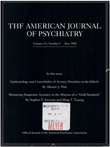The relationship between personality and DSM-III axis I disorders in the population: results from an epidemiological survey
Abstract
OBJECTIVE: The aim of this study was to assess the relationships between specific personality disorders and DSM-III axis I conditions in a community sample. METHOD: A total of 810 subjects were examined by psychiatrists in the second stage of the Eastern Baltimore Mental Health Survey, part of the Epidemiological Catchment Area Program of the National Institute of Mental Health. A semistructured examination, the Standardized Psychiatric Examination, was employed to assess axis I and axis II conditions. Scales for compulsive and antisocial personality disorders were derived from DSM-III criteria. The relationships between scores on these personality disorder scales and the presence of generalized anxiety disorder, alcohol use disorders (alcohol abuse and alcohol dependence), and simple phobia were evaluated by using logistic regression. RESULTS: Higher compulsive personality scores were associated with a greater odds of generalized anxiety disorder and simple phobia but a smaller odds of alcohol use disorders. In contrast, higher antisocial personality scores were associated with a greater odds of alcohol use disorders but a smaller odds of generalized anxiety disorder. There was no relationship between antisocial personality scores and simple phobia. CONCLUSIONS: Personality disorders have specific relationships to axis I conditions, which suggests different vulnerabilities but also different protective influences.
Access content
To read the fulltext, please use one of the options below to sign in or purchase access.- Personal login
- Institutional Login
- Sign in via OpenAthens
- Register for access
-
Please login/register if you wish to pair your device and check access availability.
Not a subscriber?
PsychiatryOnline subscription options offer access to the DSM-5 library, books, journals, CME, and patient resources. This all-in-one virtual library provides psychiatrists and mental health professionals with key resources for diagnosis, treatment, research, and professional development.
Need more help? PsychiatryOnline Customer Service may be reached by emailing [email protected] or by calling 800-368-5777 (in the U.S.) or 703-907-7322 (outside the U.S.).



